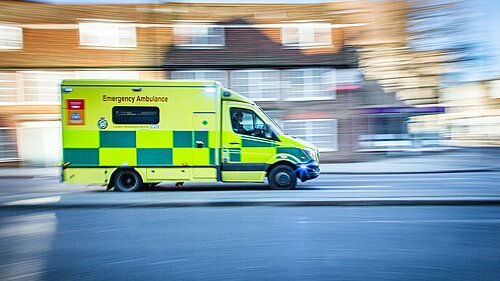No Hope in Sight?

Health care, free at the point of delivery. It’s a remarkable thing. Something few in the world have access to, which we have loved and appreciated ever since the groundbreaking report by Liberal William Beveridge in 1942 laid the foundations of the NHS. Yet over the past decade or more we have never known a period when healthcare has so consistently suffered. The impacts can be felt nationwide, locally, and most importantly, personally.
The Royal College of Emergency Medicine estimated that in 2022, 300 to 500 people a week were dying as a result of delays to emergency care[1]. OECD figures show the UK has the second lowest number of hospital beds per head of population in Europe, and just one-third the number of Germany.[2] And as with most problems, this disproportionately affects the poorest. A Healthwatch report[3] found 42% of those who were ‘struggling financially’ felt confident the NHS could meet their needs or those of their friends and family. For those ‘financially comfortable’ it was 65%.
Across Gloucestershire, cancer waiting times were missed every month last year for the 62-day target to start treatment, and every month bar one for the 31-day target. In the Cotswold District, the average response time for a Category 2 (emergency case) call was 51 minutes in January (the target for a category 2 call is 18 minutes). As I said recently at a Health Overview Scrutiny Committee: “Once again, residents are seeing their local health services get worse, not better. For too long, people in rural Gloucestershire have been let down."
And we have all felt the impact, either personally or through a loved one waiting too long to see a specialist, or for an ambulance to come, or to get the operation or the cancer treatment they need. At the same time, doctors and nurses and hospital administrators are working at a relentless pace, often above and beyond conditioned hours, with many suffering from burnout.
And the responsibility for all this? It clearly lies with the Government. Hugh Alderwick, Director of Policy at the Health Foundation, said “The underlying causes of the pressures facing the NHS aren’t new and are a result of political choices. They include a decade of under-investment in the NHS and wider public services, staff shortages in health and social care, weak capital investment, longstanding neglect of adult social care services, and more. These problems interact and have a cumulative effect on the system and its ability to operate.”[4]
It might feel as if there’s No Hope in Sight. But there is. There will be a General Election soon (although not soon enough). It will give us all the chance to elect a new Parliament, one with MPs who prioritise rather than neglect health and social care.
Change will take time. But the Liberal Democrats plan to give everyone the right to see their GP within seven days, or within 24 hours if they urgently need to, by training, recruiting, and retaining more GPs and freeing up more of their time. We will reform NHS dentistry and put mental health on the same footing as physical health. We will invest in public health and prevention so fewer people get ill and need treatment, fix the life-threatening crisis in our ambulance services and provide emergency funding to tackle poor response times.
Care is vital too. Liberal Democrats plan to introduce free personal care based on the model we introduced in Scotland in 2002, hire more social care staff, provide training and advancement, and pay them a higher wage by introducing a Carer’s Minimum Wage, as well as increasing the Carer’s Allowance so unpaid carers have the support they so desperately need.
In the North Cotswolds Labour has no chance of winning. So, if you care about the NHS, about patient care and the wellbeing of our healthcare professionals, please back my campaign.
[1] Long A&E wait times lead to more than 250 needless deaths a week - analysis - BBC News
[2] Why is the NHS in its worst ever crisis? (ft.com)
[3] What patients want a vision for the NHS in 2030 (healthwatch.co.uk)